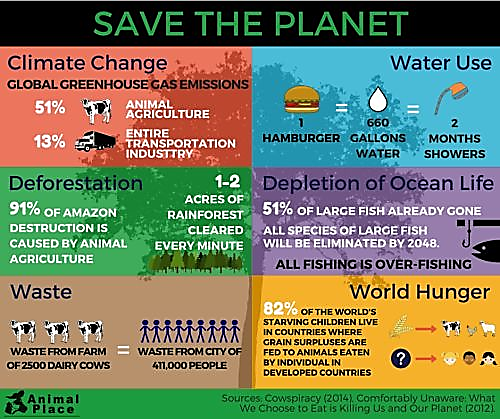You cannot have a serious discussion about the decay of our natural environment without addressing the monumental impact a meat-based diet has on it. And yet, the corporate mass media will tell you ditching plastic straws is progress and that it’s farming almonds that wastes water. They’ll even inundate our television feed with commercials that shamelessly use happy-faced animals as mascots who sell their own flesh as products, as if animals were not just stupid, but cannibals that care about human capitalism. And the purpose? To continue the perpetuation of a meat-based diet that not only destroys our collective environment, but also decays our individual health, promotes human starvation globally and promotes the needless violence and slaughter of helpless animals, all to benefit one industry – the agriculture industry.
Right now, climate change is changing our world and how we live. According to NASA, “the past five years (have been), collectively, the warmest years in the modern record” with 2018 being the fourth warmest year in the ongoing trend. According to the National Climate Assessment Report, Texas has three of the ten hottest cities in America with San Antonio coming in at #5; Houston in #7th; and Dallas in #9th place. This is caused by increased emissions of carbon dioxide and other greenhouse gases which are sent into the atmosphere which result in warming and raised temperatures that contribute to longer fire seasons, extreme weather events and lower atmospheric temperature. This means that glacier ice from the Arctic sea and snow melts faster (which ends up reducing its overall cover) and in turn, threatens arctic wildlife survival. Polar bears and penguins are just two of the many animals threatened. In addition, “global warming accelerates the rate of sea level rise, which increases flooding risks to low-lying communities, according to the Union of Concerned Scientists. And a great portion of this environmental gravitas is caused by animal agriculture, which also:
Accounts for at least 32,000 million tons of carbon dioxide per year & 51% of greenhouse emissions
Occupies 1/3 of earth’s ice-free land & covers 45% of earth’s total land
Dumps tens of millions of tons of animal waste and agriculture chemicals into the environment
Is responsible for up to 91% of Amazon destruction
Is the leading cause of species extinction, ocean dead zones, water pollution & habitat destruction
While some conservationists urge shorter showers and watering your grass less, keep in mind that 80-90% of US water consumption is attributed to animal agriculture and it takes 2,500 gallons of water to produce 1 lb. of beef! And that hamburger you’re eating…it requires 660 gallons of water to be produced which is the equivalent of 2 months’ worth of showers! Similarly, it takes:
477 gallons to produce 1lb. of eggs
Almost 900 gallons needed for 1lb. of cheese
1,000 gallons required to produce 1 gallon of milk
18 times more land use than that of a vegan diet (Cowspiracy, 2014).
According to the New Food and Agriculture Organization (FAO) greenhouse gas data estimates show that emissions from agriculture, forestry, and fisheries have nearly doubled over the last 50 years and could increase 30 percent by 2050 without regulations. Isn’t it about time humans collectively evaluated the impact of the agriculture industry we are supporting with our wallets and devise thoughtful ways to ensure that the destruction of our environment ends?
Not only does our meat-based diet impact the environment, but it also impacts our health, as a 2013 United Nations report by the Food and Agriculture Organization demonstrates – 70% of human disease directly to animal agriculture. The Centers for Disease Control and Prevention “Mortality in the United States 2017 Report” details how heart disease and cancer continue to be the top two causes of death in the US. This corresponds with the higher cholesterol averages of meat eaters (reported by the People for Ethical Treatment of Animals http://bit.do/eLWyr) which show that carnivores have consistently higher cholesterol numbers (at 194) than vegetarians (at 177) and vegans (at 146). Cholesterol levels 200 and over raise your risk for coronary heart disease. Understanding that animal products are the only sources of bad dietary cholesterol and that there is no detrimental cholesterol in plant foods, like avocados, is important to understand when evaluating the pros and cons of any diet.
In addition, in 2015 the World Health Organization has classified processed meats as a “Group 1 Carcinogen,” which means that there is strong evidence that processed meats cause cancer. These meats include bacon, ham, sausage, hot dogs, and deli meats (turkey treated with nitrates to improve flavor and preservation is included) because they can increase rates of cancer. “There is now a clear body of evidence that bowel cancer is more common among those who eat the most red and processed meat. Processed meat consumption has also been strongly linked to a higher risk of stomach cancer” (Cancer Council http://bit.do/eLV9y).
Add to these newly accepted truths (the impact on the environment and our health), the awful reality humans force upon animals and there is already a strong case to consider modifying your diet to a more plant-based one. Animals are horrifically abused, forced to live in harsh, crowded and filthy conditions. Often already diseased, they are continually artificially inseminated in order to breed beyond their natural capacity in order to give birth to babies who are to be born just to be violently killed. (Then we drink the milk that their mothers produce for their babies and are the only species that drink another species milk, despite the rampant proof that up to 75% of humans are lactose intolerant).
I became a vegetarian after witnessing scenes from “Glass Walls,”a documentary showing farm animal abuse and subsequent slaughter at a Paul McCartney concert and my life was changed. I always loved music, political activism, and animals, but it was the epic combination that transformed me. Playing the heavy metal-precursor track “Helter Skelter,” McCartney parlayed the violent connotation given to his song (by the Manson murder cult of the 60s) into a vehicle for understanding our role as humans responsible for the lives, living conditions and ultimately, violent deaths of billions of animals. It was the most shockingly horrific thing I have ever seen in my life and I am so thankful he had the courage to show it. It’s something everyone should see. To not see it and to not know what animals go through, while being a patron of animal agriculture, is willful ignorance. McCartney is quoted as saying, “if slaughterhouses had glass walls, everyone would be vegetarian.” As such, I became a vegetarian the very next day and have been nearly vegan ever since.
And there are no cons to lowering or excluding meat from your diet. My best friend Dr. Richard E. Martinez who is 50 years old, is an Ultra Marathon Runner (translation: can run up to 50 miles at a time) who happens to be vegan. Before becoming vegan, he “couldn’t run more than 10 miles at a time.” Everything in his diet is plant-derived – protein, calcium and other vitamins. He’s so healthy, he donates platelets nearly every week to the San Antonio Blood Bank, which means he has to meet strenuous health criteria. The myth that you can’t get protein, calcium and necessary vitamins from a plant-based diet is just that – a myth perpetuated by the meat and dairy industry that does not care about your health. With these facts in mind, isn’t it time to reevaluate the standard American diet?
If you need yet another reason to assess your diet, consider the irony that while the agriculture industry is greatly impacting the worldwide environment and people in the developed world are ruining their individual health through the industrialization and consumption of violently-sourced animal protein, people in under-developed nations are starving while animals that will be sent to their deaths are being fed the same grains that could be given to save them from dying. It’s an ugly human truth – a quarter of all grain produced by developing countries is given to livestock (Forks Over Knives, http://bit.do/eLWam). Horrendously, eighty-two percent of the world’s starving children live in countries where food is fed to animals, which are then killed and eaten by wealthier individuals in developed countries like the US, UK, and in Europe. An example that might be fresh in our minds thanks to the success of “Bohemian Rhapsody,” the Queen biopic which highlights the 1985 “Live Aid” concert held to fight starvation in Ethiopia. But like anything with celebrities asking the working class to donate, nothing changes and today, 40% of Ethiopians are still hungry or starving, because nothing was truly reformed to address the root of the problem. Today, as an example, Ethiopia has millions of cattle, sheep, goats, and chickens, needlessly consuming their food, land, and water. Acres of forest (25,000 acres to be exact) are cut down each year in order to make room for more animals. And 77% percent of all grains and over 90 % of all soy grown in the world was fed to livestock. Dr. Richard Oppenlander, author of Comfortably Unaware: What We Choose to Eat Is Killing Us (2012) and Our Planet and Food Choice and Sustainability: Why Buying Local, Eating Less Meat, and Taking Baby Steps Won’t Work (2013) writes, “because of the global demand for flesh, cultural, social, political, and economic influences remain strongly supportive of the continued dominance of these large companies and of the meat, dairy, and fishing industries in general. This then drives how global resources are used (land, water, rainforests, oceans, atmosphere, biodiversity, etc.), how money is spent, and how policies are determined. The demand for animal products in developed countries, whether factory farmed or not, drives resource depletion in developing countries while also exacerbating poverty and hunger.”
But make no mistake, even with climate change and weather extremes, there is enough grain “globally to feed two times as many people as there are on Earth” (Andersen & Keegan, Cowspiracy, 2014). In 2011, there was a record harvest of grain in the world, with over 2.5 billion tons, but half of that was fed to animals in the meat and dairy industries. There is no food shortage and there is no excuse for people living in poverty or dying of hunger. Like Nelson Mandela said, “Poverty is not natural. It is man-made and it can be overcome and eradicated by the actions of human beings. Sometimes it falls on a generation to be great.” Whether that ever happens remains to be seen. It certainly didn’t happen in Mandela’s lifetime.
Our shared environmental decay (caused by the agricultural industry ejecting carbon dioxide and greenhouse emissions, overtaxing our water and land in order to produce animal meat), people dying of cardiovascular disease and cancer (from eating animal products), and the continued starving population (from feeding grain to animals instead of people because of profit), among the backdrop of the horrendous torture animals are born to experience are all symptoms of a capitalistic society without restriction or any moral compass. This is something for our generation to come to terms with. As a Buddhist teacher, peace activist and vegan Thich Nhat Hanh stated, “I am determined not to kill, not to let others kill, and not to support any act of killing in the world. We should consume in such a way that helps reduce the suffering of living beings. And that way we can preserve compassion in our hearts.” As a near-vegan, it feels good to say, “my food is grown and harvested, not born and killed” and know that that makes a difference not only to the animals I call friends but to my fellow humans, my own health and that of the environment we all share.
Further information: documentaries Forks Over Knives (2011), Cowspiracy (2014), and What the Health (2017) Visit http://thevegancalculator.com/#calculator to calculate how many animals you “save” by going vegetarian or vegan.
Meat-Based Environmental Destruction









